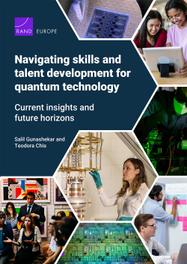Navigating skills and talent development for quantum technology
Current insights and future horizons
ResearchPublished Apr 13, 2025
Quantum technology is advancing rapidly, highlighting the need for a skilled workforce. In this study, we find that the global quantum technology ecosystem is becoming increasingly heterogeneous, integrating various expertise and disciplines, yet faces challenges to the availability and distribution of skills. We propose policy actions to develop a resilient, equitable and future-ready quantum technology skills pipeline and workforce.
Current insights and future horizons
ResearchPublished Apr 13, 2025

The capabilities of quantum technologies have advanced significantly in recent years, demonstrating their potential across various sectors such as the life sciences, finance, aerospace, defence, energy and telecommunications. The rapid evolution of these technologies highlights the need for a skilled workforce capable of driving innovation and translating theoretical advancements into practical applications. Against this backdrop, RAND Europe and the Novo Nordisk Foundation convened a roundtable discussion to discuss critical issues related to skills development within the quantum technology ecosystem. Participants, comprising thought leaders, researchers, industry experts and policymakers, examined the key emerging trends, challenges and opportunities, and discussed strategies to bridge the quantum technology skills gap and nurture a robust talent pipeline.
This report captures the perspectives and insights of participants at the roundtable, serving as a concise guide to inform and contribute to the broader stakeholder discourse on quantum technology skills and talent, as policy on these key issues develops. The discussions also informed a set of cross-cutting policy considerations aimed at guiding stakeholders in building a resilient, equitable and future-ready quantum technology workforce. These considerations emphasise the importance of collaboration and community building, stress the need to expand and diversify skills and perspectives, and encourage stakeholders to approach skills systems holistically with forward planning. Taken together, these policy considerations can be regarded as a set of cross-cutting principles that could underpin a future 'Quantum Technology Skills Charter', expressing a collective statement of intent, ambition and commitment among stakeholders including public, private and third sector (including civil society) entities.
Funding for this independent research was provided by gifts from RAND supporters and income from operations. The research was conducted within the RAND Europe.
This publication is part of the RAND research report series. Research reports present research findings and objective analysis that address the challenges facing the public and private sectors. All RAND research reports undergo rigorous peer review to ensure high standards for research quality and objectivity.
This document and trademark(s) contained herein are protected by law. This representation of RAND intellectual property is provided for noncommercial use only. Unauthorized posting of this publication online is prohibited; linking directly to this product page is encouraged. Permission is required from RAND to reproduce, or reuse in another form, any of its research documents for commercial purposes. For information on reprint and reuse permissions, please visit www.rand.org/pubs/permissions.
RAND is a nonprofit institution that helps improve policy and decisionmaking through research and analysis. RAND's publications do not necessarily reflect the opinions of its research clients and sponsors.